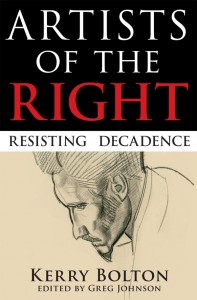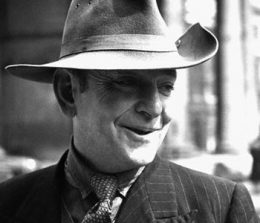Remembering Roy Campbell
(October 2, 1901–April 22, 1957)
Greg Johnson
1,562 words
Roy Campbell was a South African poet and essayist. T. S. Eliot, Dylan Thomas, and Edith Sitwell praised Campbell as one of the best poets of the inter-war period. Unfortunately, his conservatism, Nietzscheanism, and Catholicism, as well as his open contempt for the Bloomsbury set and his participation in the Spanish Civil War on the Fascist side, have led his works being consigned to the memory hole. Campbell died in Portugal in 1957 in a car crash.
Roy Campbell’s poem “Horses on the Camargue” has been published on this site previously. Below is an expanded selection of his poems.
Also on this site, see:
- Kerry Bolton’s “Roy Campbell,” from Artists of the Right.
- Adrian Davies, “Culture & ‘Engagement’: French & English Perspectives.“
- Kensall Green’s “Ignatius Royston Dunnachie Campbell: A Commemoration.“
Offsite, see Roger Scruton’s “A Dark Horse.”
When time permits, we will make more of Campbell’s poems available at Counter-Currents.
Autumn
I love to see, when leaves depart,
The clear anatomy arrive,
Winter, the paragon of art,
That kills all forms of life and feeling
Save what is pure and will survive.
Already now the clanging chains
Of geese are harnessed to the moon:
Stripped are the great sun-clouding planes;
And the dark pines, their own revealing,
Let in the needles of the noon.
Strained by the gale the olives whiten
Like hoary wrestlers bent with toil
And, with the vines, their branches lighten
To brim our vats where summer lingers
In the red froth and sun-gold oil.
Soon on our hearth’s reviving pyre
Their rotted stems will crumble up:
And like a ruby, panting fire,
The grape will redden on your fingers
Through the lit crystal of the cup.
The Zebras
From the dark woods that breathe of fallen showers,
Harnessed with level rays in golden reins,
The zebras draw the dawn across the plains
Wading knee-deep among the scarlet flowers.
The sunlight, zithering their flanks with fire,
Flashes between the shadows as they pass
Barred with electric tremors through the grass
Like wind along the gold strings of a lyre.
Into the flushed air snorting rosy plumes
That smoulder round their feet in drifting fumes,
With dove-like voices call the distant fillies,
While round the herd the stallion wheels his flight,
Engine of beauty volted with delight
To roll his mare among the trampled lilies.
The Making of a Poet

You can buy Kerry Bolton’s Artists of the Right here.
In every herd there is some restive steer
Who leaps the cows and heads each hot stampede,
Till the old bulls unite in jealous fear
To hunt him from the pastures where they feed.
Lost in the night he hears the jungles crash
And desperately, lest his courage fail,
Across his hollow flanks with sounding lash
Scourges the heavy whipcord of his tail.
Far from the phalanxes of horns that ward
The sleeping herds he keeps the wolf at bay,
At nightfall by the slinking leopard spoored,
And goaded by the fly-swarm through the day.
The Georgiad (excerpt)
Dinner, most ancient of the Georgian rites,
The noisy prelude of loquacious nights,
At the mere noise of whose unholy gong
The wagging tongue feels resolute and strong,
Senate of bores and parliament of fools,
Where gossip in her native empire rules;
What doleful memories the word suggests -‘
When I have sat like Job among the guests,
Sandwiched between two bores, a hapless prey,
Chained to my chair, and cannot get away,
Longing, without the appetite to eat,
To fill my ears, more than my mouth, with meat,
And stuff my eardrums full of fish and bread
Against the din to wad my dizzy head:
When I have watched each mouthful that they poke
Between their jaws, and praying they might choke,
Found the descending lump but cleared the way
For further anecdotes and more to say.
O Dinners! take my curse upon you all,
But literary dinners most of all . . .
The Serf
His naked skin clothed in the torrid mist
That puffs in smoke around the patient hooves,
The ploughman drives, a slow somnambulist,
And through the green his crimson furrow grooves.
His heart, more deeply than he wounds the plain,
Long by the rasping share of insult torn,
Red clod, to which the war-cry once was rain
And tribal spears the fatal sheaves of corn,
Lies fallow now. But as the turf divides
I see in the slow progress of his strides
Over the toppled clods and falling flowers,
The timeless, surly patience of the serf
That moves the nearest to the naked earth
And ploughs down palaces, and thrones, and towers.
Reflection
My thought has learned the lucid art
By which the willows lave their limbs
Whose form upon the water swims
Though in the air they rise apart.
For when with my delight I lie,
By purest reason unreproved,
Psyche usurps the outward eye
To trace her inward sculpture grooved
In one melodious line, whose flow
With eddying circle now invests
The rippled silver of her breasts,
Now shaves a flank of rose-lit snow,
Or rounds a cheek where sunset dies
in the black starlight of her eyes.
The Golden Shower
Though we seem merely mortal, what we are
Is clearly mirrored on a deathless flood.
We change and fade: our dust is strewn afar—
Only the ancient river of our blood,
Rising far-off in unimagined spaces,
Red with the silt and ruin of the past
And churning with the strife of savage races,
Like deep Zambezi goes on rolling past,
Swiftens through us its energies unending,
And reaches out, beneath the shades we cast,
To what vast ocean of the night descending,
Or in what sunny lake at last to sleep,
We do not know — save that it turns to foam,
Just here, for us; its currents curl and comb
And all its castalies in thunder leap,
Silvering, forth into a white resilience
Of ecstasy, whose momentary brilliance
Must compensate eternities of sleep.
Knowing these things, are not we lovers, then,
Though mortal in our nature, more than men?
Since by our senses, as by rivers, veined,
The hills of primary memory are drained,
And the dim summits of their frosty spars,
Whose tops are nibbled by the grazing stars,
Thawed by the rising noon of our desire,
And fusing into consciousness and fire,
Down through the sounding canyons of the soul
Their rich alluvium of starlight roll.
We are Like Worlds
We bear to future times the secret news
That first was whispered to the new-made earth:
We are like worlds with nations in our thews,
Shaped for delight, and primed for endless birth.
We never kiss but vaster shapes possess
Our bodies: towering up into the skies,
We wear the night and thunder for our dress,
While, vaster than imagination, rise
Two giant forms, like cobras flexed to sting,
Bending their spines in one tremendous ring
With all the starlight burning through their eyes,
Fire in their loins, and on their lips the hiss
Of breath indrawn above some steep abyss.
When, like the sun, our heavenly desire
Has turned this flesh into a cloud of fire
Through which our nerves their strenuous lightning fork
Eternity has blossomed in an hour
And as we gaze upon that wondrous flower
We thin the world a beetle on its stalk.
Mass at Dawn
I dropped my sail and dried my dripping seines
Where the white quay is chequered by cool planes
In whose great branches, always out of sight,
The nightingales are singing day and night.
Though all was grey beneath the moon’s grey beam,
My boat in her new paint shone like a bride,
And silver in my baskets shone the bream:
My arms were tired and I was heavy-eyed,
But when with food and drink, at morning-light,
The children met me at the water-side,
Never was wine so red or bread so white.
The Sisters
After hot loveless nights, when cold winds stream
Sprinkling the frost and dew, before the light,
Bored with the foolish things that girls must dream
Because their beds are empty of delight,
Two sisters rise and strip. Out from the night
Their horses run to their low-whistled pleas—
Vast phantom shapes with eyeballs rolling white,
That sneeze a fiery stream about their knees:
Through the crisp manes their stealthy prowling hands,
Stronger than curbs, in slow caresses rove,
They gallop down across the milk-white sands
And wade far out into the sleeping cove:
The frost stings sweetly with a burning kiss
As intimate as love, as cold as death:
Their lips, whereon delicious tremours hiss
Fume with the ghostly pollen of their breath.
Far out on the grey silence of the flood
They watch the dawn in smouldering gyres expand
Beyond them: and the day burns through their blood
Like a white candle through a shuttered hand.
Anadyomene
Maternal Earth stirs redly from beneath
Her blue sea-blanket and her quilt of sky,
A giant Anadyomene from the sheath
And chrysalis of darkness; till we spy
Her vast barbaric haunches, furred with trees,
Stretched on the continents, and see her hair
Combed in a surf of fire along the breeze
To curl about the dim sierras, where
Faint snow-peaks catch the sun’s far-swivelled beams:
And, tinder to his rays, the mountain-streams
Kindle, and volleying with a thunderstroke
Out of their roaring gullies, burst in smoke
To shred themselves as fine as women’s hair,
And hoop gay rainbows on the sunlit air.
* * *
Counter-Currents has extended special privileges to those who donate at least $10/month or $120/year.
- Donors will have immediate access to all Counter-Currents posts. Everyone else will find that one post a day, five posts a week will be behind a “paywall” and will be available to the general public after 30 days. Naturally, we do not grant permission to other websites to repost paywall content before 30 days have passed.
- Paywall member comments will appear immediately instead of waiting in a moderation queue. (People who abuse this privilege will lose it.)
- Paywall members have the option of editing their comments.
- Paywall members get an Badge badge on their comments.
- Paywall members can “like” comments.
- Paywall members can “commission” a yearly article from Counter-Currents. Just send a question that you’d like to have discussed to editor@counter-currents.com. (Obviously, the topics must be suitable to Counter-Currents and its broader project, as well as the interests and expertise of our writers.)
To get full access to all content behind the paywall, please visit our redesigned Paywall page.
Remembering%20Roy%20Campbell%0A%28October%202%2C%201901%E2%80%93April%2022%2C%201957%29%0A
Share
Enjoyed this article?
Be the first to leave a tip in the jar!

1 comment
I’ve spent the last half hour reading and reading of Campbell. Although I’m not much into poetry, I quite enjoyed it and thought again that it’s wonderful that Counter-Currents has such a wide ambit.
Comments are closed.
If you have a Subscriber access,
simply login first to see your comment auto-approved.
Note on comments privacy & moderation
Your email is never published nor shared.
Comments are moderated. If you don't see your comment, please be patient. If approved, it will appear here soon. Do not post your comment a second time.